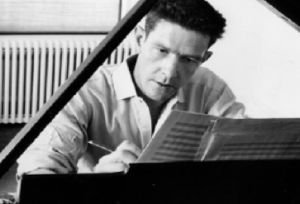
This last year, 2012 would have been experimental musician, artist, writer, and former Mills faculty John Cage’s 100th birthday. Current faculty member David Bernstein traveled to a few conferences and gatherings this past year in honor of Cage’s centennial.
Bernstein has been at Mills since 1989. Since then he has become a Cage scholar, and wrote the book “Writings through John Cage’s Music, Poetry, and Art,” with Christopher Hatch.
Bernstein attended the “John Cage’s Music of Changes and Its Genesis,” international symposium in Berlin, Germany in March 2012. Where he spoke at the conference and also greatly enjoyed being back in Berlin, where Bernstein had lived in 1985, before the Berlin Wall was torn down.
“It was great to be back in Berlin, it’s such an exciting and vibrant place,” Bernstein said, “I really like going to international conferences to meet people and see the different cultural context.”
Bernstein also traveled to a conference in Rome, Italy in April 2012, where Bernstein became friends with Italian harpist Floreada Sacchi. Sacchi performed Cage’s music and her own at a small gathering and asked Bernstein to give a short pre-concert talk.
“It was such a special experience. To get to know people, it was like a think tank, to get to interact with different scholars,” Bernstein said.
Bernstein liked the feel of the international conferences, where he said they’re very different from the more American conferences that seem to be based around the job market in order to make connections and advance their careers. Which is not what happened at these conferences. Connections were made, but in a much more friendly way.
Bernstein feels really lucky to work at the same place Cage did. While Cage left Mills in 1992 shortly before his death, Bernstein only had one real interaction with Cage, where after a performance, he shook Cage’s hand and talked to him briefly.
“I feel so lucky because Mills has this history in which John Cage was such a prominent figure in what we have now. Especially from when he worked with the dance department and tradition of experimental music,” said Bernstein.



